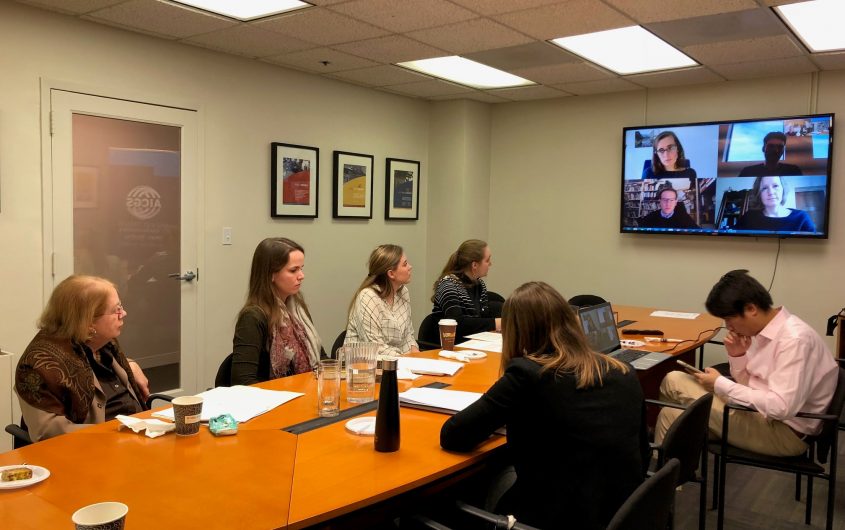
A German-American Dialogue of the Next Generation
Society, Culture & Politics Virtual Meeting
The participants of the Society, Culture & Politics group of the AGI Project “A German-American Dialogue of the Next Generation” came together to focus on reconciliation and civil society as it relates to both German-American bilateral relations and German-American cooperation/conflict in global hotspots. The participants come from a variety of backgrounds, including think tanks, academia, and civil society organizations. During this second virtual meeting on Thursday, February 21, 2019, the participants identified and discussed relevant issues of German-U.S. bilateral relations and German-U.S. cooperation in the international arena. The participants focused in on their recommendations for civil society and governments on both sides of the Atlantic.
“Shrinking Spaces”
- The United States and Germany should focus on maintaining societal spaces for democratic discourse. Both governments do this already, but they should continue and strengthen their efforts. The German government should take the initiative to work with the United States to preserve democracy.
- There needs to be domestic debate about who can promote what: how can foreign agents interact with democracies?
- In the transatlantic partnership, the focus should turn to ideals shared by both Germany and the United States: the maintenance of the liberal democratic world order. Both countries should return to democratic basics.
- In addition to governmental activity, civil society organizations should also take a more active, political, and outspoken role in democracy promotion.
Civil Society and Development Aid Implementation
- Civil society organizations should become more active as an intermediary between development organizations, agencies, and policymakers.
- Policymakers tend to focus on quantitative measures, such as financial accountability, by requiring development organizations to track and account for all of their budget. This produces a greater administrative burden on the organizations, which wastes money that could otherwise be spent on programs.
- Instead, governments should evaluate development organizations based on qualitative measures such as impact and people being helped. Care should also be taken not to disadvantage long-term development projects in which the pay-off isn’t immediately obvious or realized, but that will over time be more effective than short-term projects.
- Civil society organizations should cooperate with one another to influence policymakers to adopt accountability measures that do not harm development organizations.
- Governments should work to make it easier and less bureaucratic for development organizations to receive funding.
Normative Conflict within Civil Society
- German and American governments attempt to empower different minority civil groups, but sometimes those groups hold contrary normative values (especially religious civil groups and gender/sexual orientation civil groups).
- When we speak of “civil society,” who does that mean? Who should it mean? Different political leaders will tend to interact and heed different parts of society. Not all parts of civil society have the same goals and value the same things, and this can cause conflict.
Bilateral Civil Society
- The amount of German university students coming to the United States to do cultural exchanges has recently declined, while the amount of American university students going to Germany has increased.
- These cultural experiences and relationships help to maintain friendly relations between Germany and America, so they should be supported.
- A centralized, organized way for American university students on exchange in Germany to visit German high schools as cultural ambassador guest speakers would help to encourage German students to consider an exchange to the United States. Civil society should build and facilitate this effort.
- Germany’s vocational training system is very good, and Americans could stand to learn a lot from German tradesmen/women. There should be developed a vocational training exchange between the United States and Germany, especially since people engaged in vocational training are less likely to experience international cultural exchanges otherwise.
Immigration
- It would be good if organizations run by immigrants on both sides of the Atlantic could come into contact with each other and cooperate. It’s important that immigrant voices enter the transatlantic dialogue. Civil societies should support immigrant organizations and communities in this endeavor.
- Discourse in both Germany and America should move away from using the term “integration” when they mean “assimilation,” because that sort of discourse is discriminatory against immigrant cultures. Both countries need to accept the new social realities that have come about due to immigration.
Renewing/Rephrasing the Transatlantic Partnership
- Recently there have been strains of the German-American relationship: how can those relations be improved? How can the United States and Germany pull closer in order to navigate and respond to the contemporary global situation?
- The short-term goal is to improve relations, but long term, the liberal international world order itself is under threat.
- The German foreign ministry is clearly already considering these challenges as evidenced by the “Deutschlandjahr” initiative.
- What is the “old narrative” vs. the “new narrative” of the transatlantic partnership? Usually that refers to Cold War era German-American relations, characterized by the United States’ defense of Western European democracy and capitalism and Germany’s unique position as a divided country in which the Cold War played out with heightened intensity. But three decades have passed since the end of the Cold War—in that time, there must already be a new narrative.
- The transatlantic partnership is dominated by elite white men—other voices should enter the dialogue.







